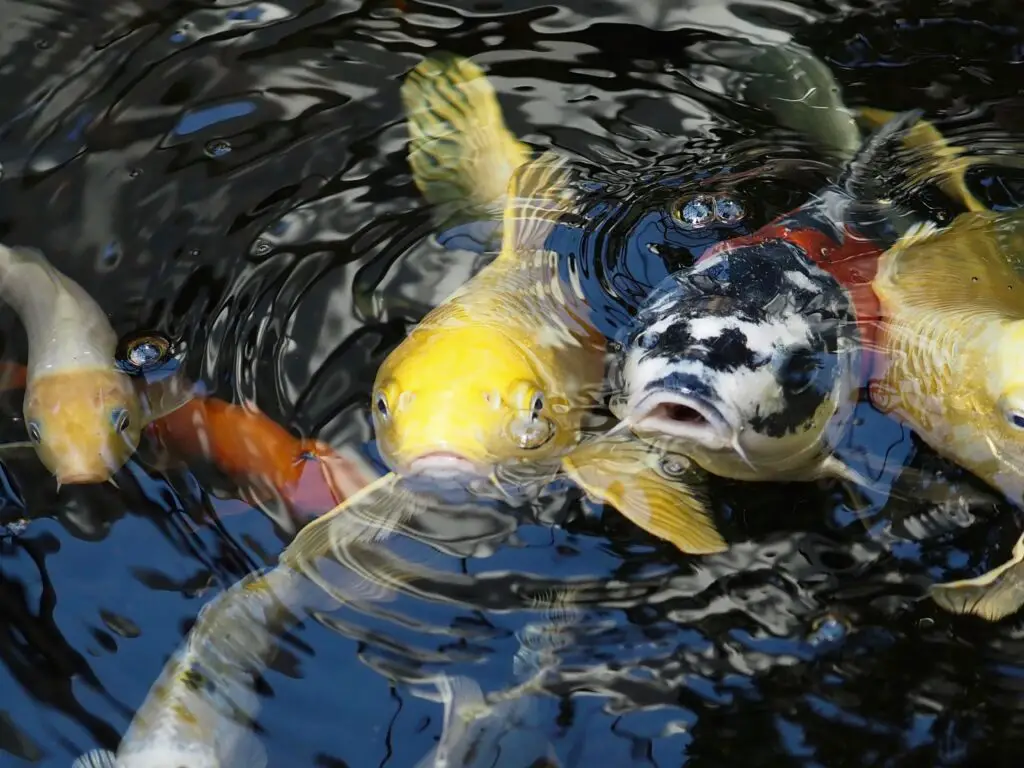
Koi fish are social creatures. The word “koi” literally means “love,” and they have been known to enjoy the company of their peers and owners. If you are looking into getting these loving fish, you may wonder if keeping koi fish is cruel. We have done a little digging (and soul-searching) and have found that the answer is yes, and no.
It is not cruel to keep koi fish if you treat them well. Keep your koi in a pond that is safe from predators. Ensure that the pond is clean and deep enough to allow freedom of movement and temperature control. Koi loves company, so keep two or more.
Keeping animals in captivity is usually a contentious subject. If you are interested in maintaining koi, you will be happy to know that there are ways you can own koi and keep them happy and healthy. Let’s look into keeping koi to learn whether or not it is cruel. We will delve into the practice of keeping them and how you can ensure that you are keeping them in a way that is not cruel.
Pro Tip: If you’re tired of wasting money and making costly mistakes on the koi-keeping hobby or are thinking about buying koi fish but don’t know where to start, I strongly suggest you check out this ebook. I recently read this ebook, and it contains SO much useful information, such as:
- 3 proven steps to identify koi fish diseases
- WARNING: 3 things you should NEVER do when it comes to caring for koi
- When to seek professional help when it comes to looking after your koi
Is It Cruel To Keep Koi Fish?
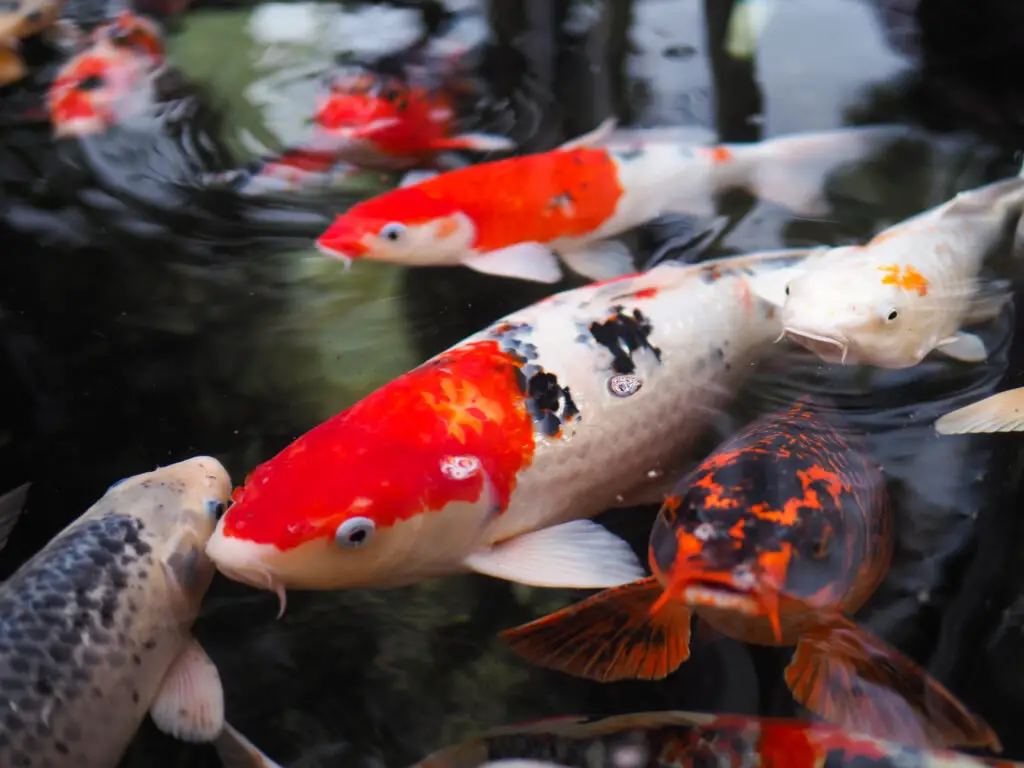
To understand if it is cruel to keep koi fish, we need to know a little about their history. Koi fish were bred from their wild ancestors, the carp. The predecessors of the koi we know today were plain in color and lived in freshwater. Koi fish were domesticated first as food and later for decorative purposes.
Koi fish became more friendly towards human beings once they had been domesticated. We see koi fish with various personalities, but they are generally warm, loyal, and loving to each other and their owners. When koi are released into the wild, they soon lose their color and nature of being friendly with humans.
The koi we know and love today did not originate in the wild. Although koi have been introduced to the wild in many countries, they typically do better and live longer in captivity since they were bred for life in captivity. This leads to whether or not it is cruel to keep koi fish.
Certain exotic pets, like lions, cheetahs, alligators, and the like, should not be kept as pets. Their nature does not allow for domestication, and we cannot provide all they need for a happy, healthy, fulfilled life. Koi fish were not brought in from the wild. Instead, they were bred in captivity for use as food and then as ornamental pets.
The fact that koi fish are not meant to live in the wild leads us to believe that it is not cruel to keep koi fish. Whether it is cruel to breed animals for our enjoyment is another issue altogether. We will leave you to form your own opinion on this matter. Like any pet, koi fish rely on us for survival, and we are responsible for providing all the fish need to live a healthy, fulfilling life.
Suppose you have watched a group of koi fish, in that case, you will have noticed a variety of personalities and temperaments among the fish. Since koi have individual personalities and show a range of feelings, it may be good to learn a little more about them. Understanding koi fish will help you take care of your koi fish in the best possible way, ensuring you are not cruelly treating them.
Do Koi Fish Have Feelings?
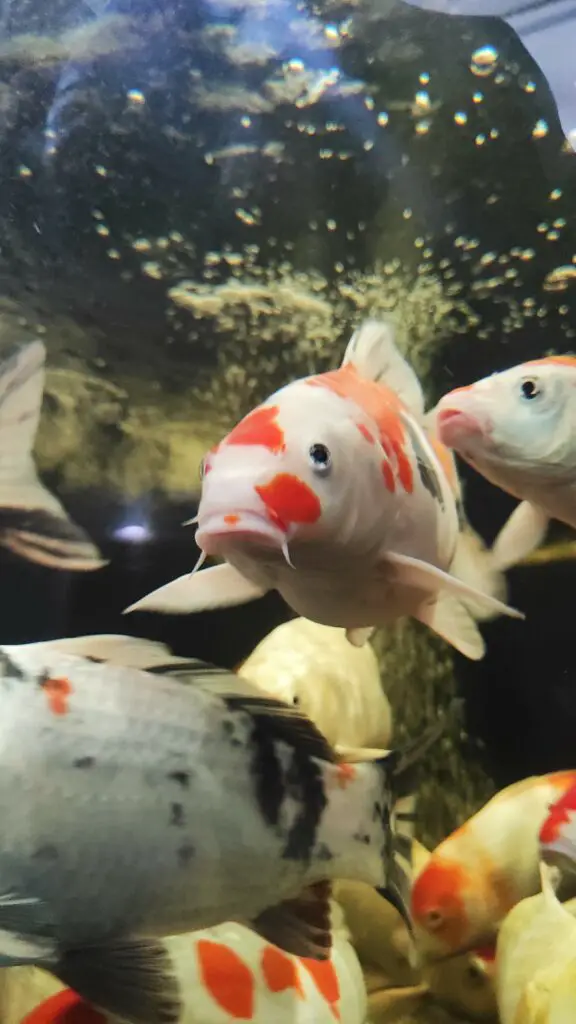
Koi fish are intelligent beings that can show feelings. If a koi fish is well-fed and lives in a clean and safe environment, it will be happy, friendly, and loyal. From time to time, koi feel the need for a bit of space and will retreat until it is ready to socialize again.
Koi fish have been likened to dogs. Although we do not understand them as well as dogs, we can see when they exhibit similar behaviors. When koi fish know and trust their owners, they are happy to see them and enjoy being petted.
You may notice that a koi fish is feeling sad or down. It is possible for koi to feel this way. Koi fish may show signs of sadness, anxiety, or depression when moved into a new environment. They also get lonely. If you have only one or two koi fish and notice that one or both are feeling sad, you may wish to consider adding more to the pond.
Koi fish tend to get sad, nervous, or even depressed for the following reasons:
- A quick transition. Make any changes to your koi fish environment slowly to avoid upsetting them.
- Predators. If your koi fish are nervous or anxious, there could be a predator trying to catch them when you are not around.
- Low oxygen. If your fish are jumping or gasping for air near the water’s surface, it could mean that your water is low in oxygen.
- Hazards in the pond. If your koi fish are skipping meals or staying at the bottom of the pond, it could mean there is a hazard in the pond. Injured fins are another sign that there could be something that needs to be mended. Check the pond for broken items to keep your koi fish safe and have them return to their happy selves.
- Loneliness. Unfortunately, as much as you may love your koi fish and interact with it, it will likely need the companionship of other koi fish. Koi fish are highly friendly and love to interact with you, their owner, and others of their species.
- A bad diet. Be sure to feed your koi fish a good quality diet. Koi fish cannot digest carbohydrates, animal fats, or dairy products, so these should not be included in their staple foods.
If you have noticed that your koi fish are looking a little down, there is likely something in their environment that needs looking at. It should be a simple matter to fix, and then you should notice an improvement in how your fish feel.
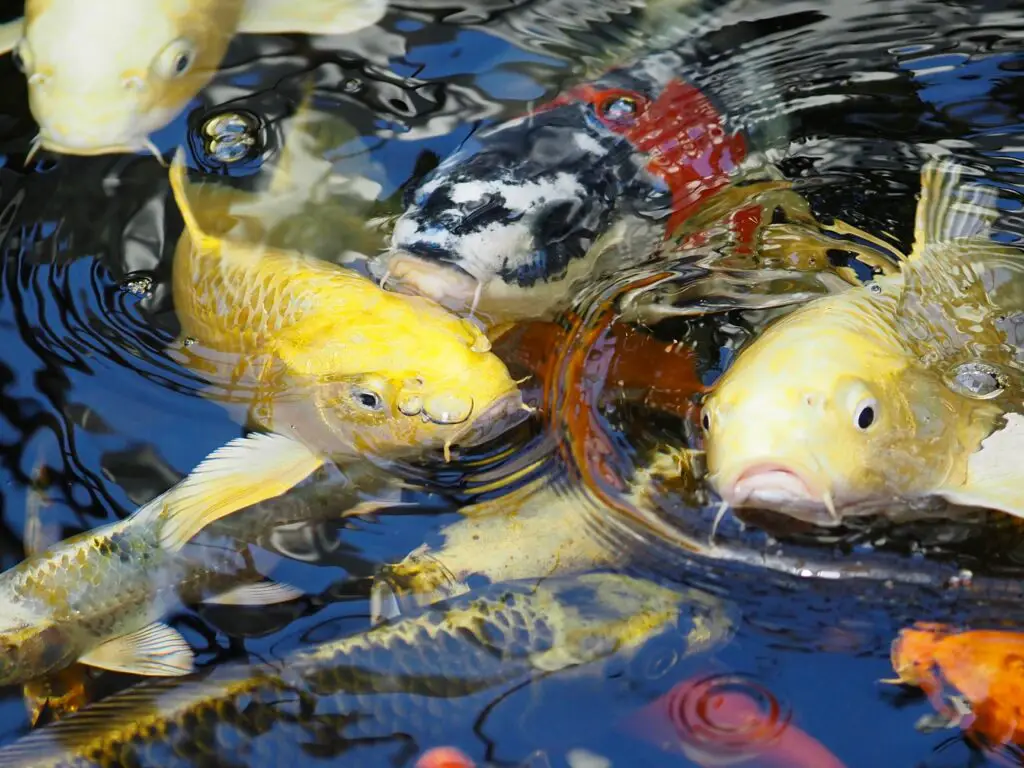
Koi fish tend to get happy or excited for the following reasons:
- They are regularly fed. Try to maintain a regular feeding time for your koi fish. Much like human beings, they have long-term memory. This means they can remember details about their lives, including when they are fed. If you keep a regular feeding time, they will begin to expect it and look forward to it.
- They are fed good quality food. Keep your koi fish healthy and happy by providing them with good quality fish food. Young koi enjoy eating fish flakes, medium-sized or average koi benefit from eating fish pellets, and large koi enjoy bars of fish food. Between meals, koi enjoy eating snacks of fruit, vegetables, dog and cat food, and certain meats. Koi fish cannot digest carbohydrates, animal fats, or dairy products, so be sure to give them fish food as their main diet and only provide them with the rest as snacks.
- Their environment is clean and safe. Koi fish feel happy and secure in a clean, oxygenated environment safe from predators and hazards that could hurt them. Keep an eye on your koi pond to ensure your koi fish are safe and, therefore, happy and calm.
- You interact with them at feeding time. Most koi fish love to interact with their owners at feeding time. They may become playful, jump, or ask for a pet. Be sure to interact with them and enjoy spending time with your beautiful pets.
- You follow their cues and pet them when they ask for it. You will know your koi fish is asking for a pet if it comes to the surface and looks at you. Try to give it a gentle pat on the head. If it returns for more, you will know it enjoys this form of attention.
- They have other koi fish to socialize with. Koi fish are sociable animals. Koi enjoy the company of other koi fish and often interact with them. Try to invest in two or more koi if you plan to keep them.
- They know and trust you, their owner. It may take a short while, but if you are consistent with your koi fish and treat them well, they will learn to trust you and enjoy your company.
We can see that koi fish have feelings. Like land pets, koi react to their environment and must be kept clean, healthy, safe, and entertained. If you wish to keep your koi fish in a not cruel way, be sure to research the best practices when keeping them. When you have happy, healthy koi, the experience will be rewarding for you and will ensure the koi fish live long and fulfilling lives.
Do Koi Fish Have Personalities?
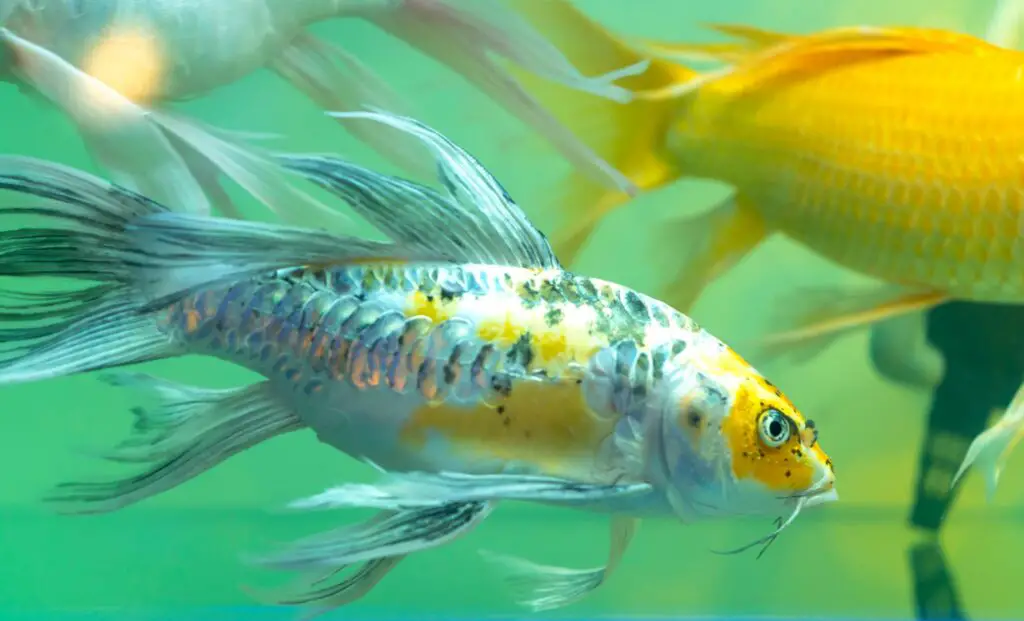
Koi fish do appear to have individual personalities. Like human beings, some seem more laid back, and some are more short-tempered. Koi owners have also noticed that, although koi are social beings, they sometimes become overwhelmed by too much company.
You could see a koi retreating for a bit of space from time to time.
In captivity, koi fish tend to become friendly with their owners. They will greet their owners and interact at feeding time. Some koi enjoy a pat on the head from their owner at feeding time. They will repeatedly come up and request this form of affection. We can see koi fish playing with each other. They sometimes rub against each other and fight from time to time.
How To Ensure Koi Are Well Cared-For
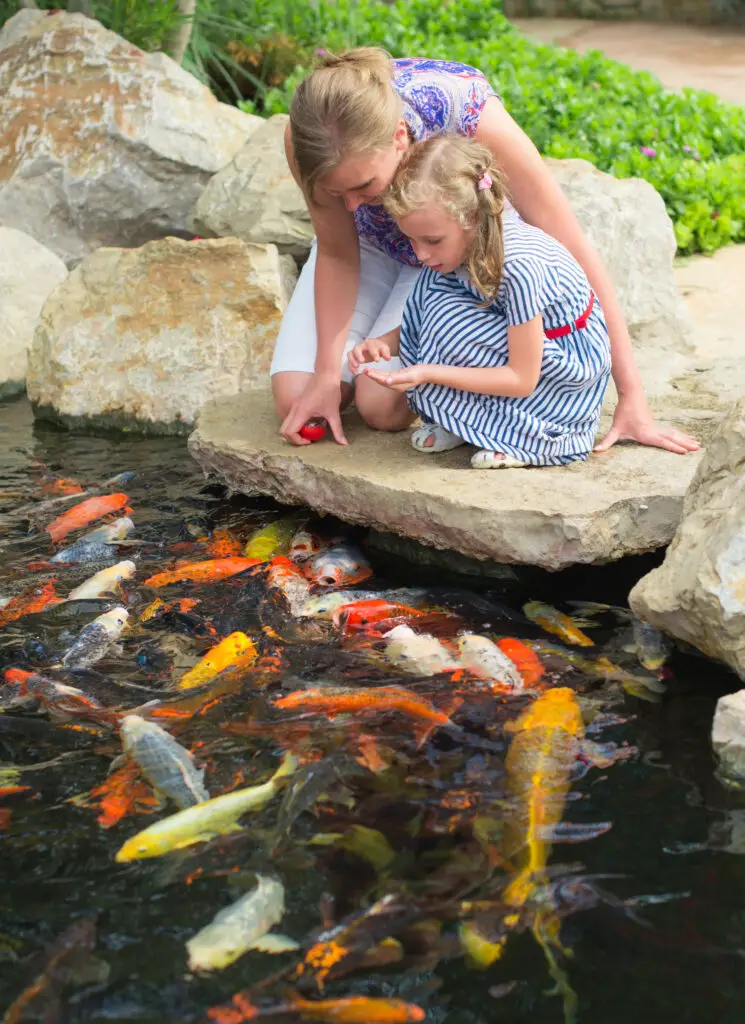
When we look at cruelty and fish keeping, we must look at two main factors: psychological and emotional health and physical health. Keeping any animal in captivity is cruel if you do not adequately care for the animal. Let us look at how to ensure we treat our koi well when in our care.
Psychological And Emotional Health
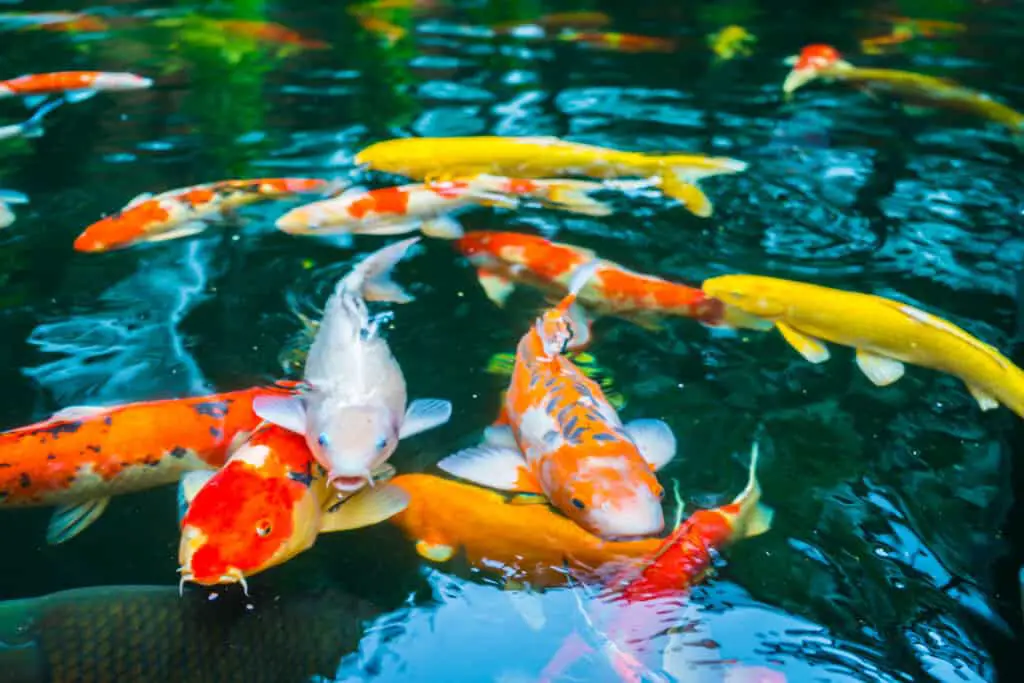
Koi fish are intelligent beings that feel emotions based on what happens to them. They are social and enjoy the company of other fish and their owners. It is cruel to keep koi fish if their mental and emotional needs are not met.
You can meet the basic psychological and emotional needs of your koi fish in the following ways:
- Provide them with koi company. Never keep only one koi at a time. Two or more are ideal.
- Provide the koi with enough space. Ensure your pond is deep enough for your koi to spend their time at deep or shallow heights as they prefer.
- Interact with your koi when feeding them. Watch their cues to learn if they would like a pat on the head at feeding time. Koi fish have been compared to dogs, so they will most likely enjoy interacting with you.
- Give your koi fish consistent attention. Like a puppy wagging its tail when it sees you, your koi fish will show their happiness when they see you.
- Take note when you see one or more of your koi looking sad. This indicates that you need to change something in their environment.
- The easiest and possibly most important way to keep your koi fish happy is by keeping them healthy. Be sure to feed them well and regularly, and keep their environment clean to keep them happy and healthy.
Koi fish are a joy to keep and a wonder to watch. Take pleasure in learning the personalities of your fish and enjoy their company as they enjoy yours.
Physical Health
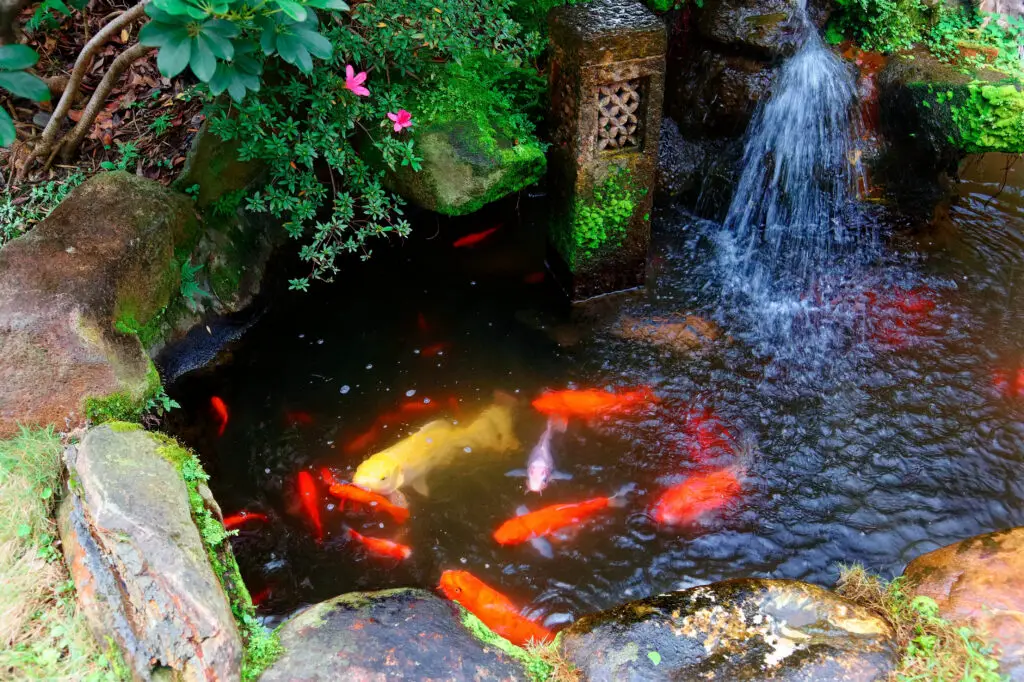
It is essential to focus on your koi’s mental and emotional health. In general, however, koi fish that are well-fed and live in a clean pond will be happy overall. Focus on the physical well-being of your koi to ensure they remain healthy and, therefore, delighted.
You can meet the basic physical needs of your koi fish in the following ways:
- Provide a large enough pond for all the koi fish you are keeping. Ensure that the pond is deep enough for koi. Koi ponds should be around three feet deep, with areas no shallower than two feet. A deep pond allows your koi fish to stay out of sight of predators. It also provides them with enough space to move freely.
- Have a pond with a flat, smooth bottom. Koi fish are prone to developing ulcers. For this reason, you should ensure the bottom of the pond is smooth to avoid having your koi fish rub against rough surfaces.
- Provide heating in winter, or move your koi to a warmer indoor aquarium. If you live in an area with particularly cold winter months, you may wish to consider installing a water heater for the pond. Although this is a fairly pricy investment, your koi fish will benefit from being able to stay in their home pond rather than freezing during winter or having to relocate.
- Keep your koi pond clean by skimming the surface for dead leaves before they decay. Use a variety of pond plants to help with algae. Consider introducing beneficial bacteria to avoid algae overgrowth, to stop it from turning your pond water green.
- Feed your koi fish good quality fish food. Koi fish can eat foods like fruit, vegetables, certain meats, and cat and dog food as snacks but should be fed fish food for their primary diet.
- Be wary of overcrowding your koi pond. Although koi enjoy company, having too many in a pond will lead to high ammonia levels, which are terrible for koi fish.
- Provide protection from predators. Koi fish are not built to avoid predators. This makes them an easy target for birds, badgers, and other animals looking for a tasty meal. Protect your koi fish in the form of netting, decoys, movement sensors, and scarecrows. Do not build steps in your koi pond; provide hiding places for your koi fish to use when needed.
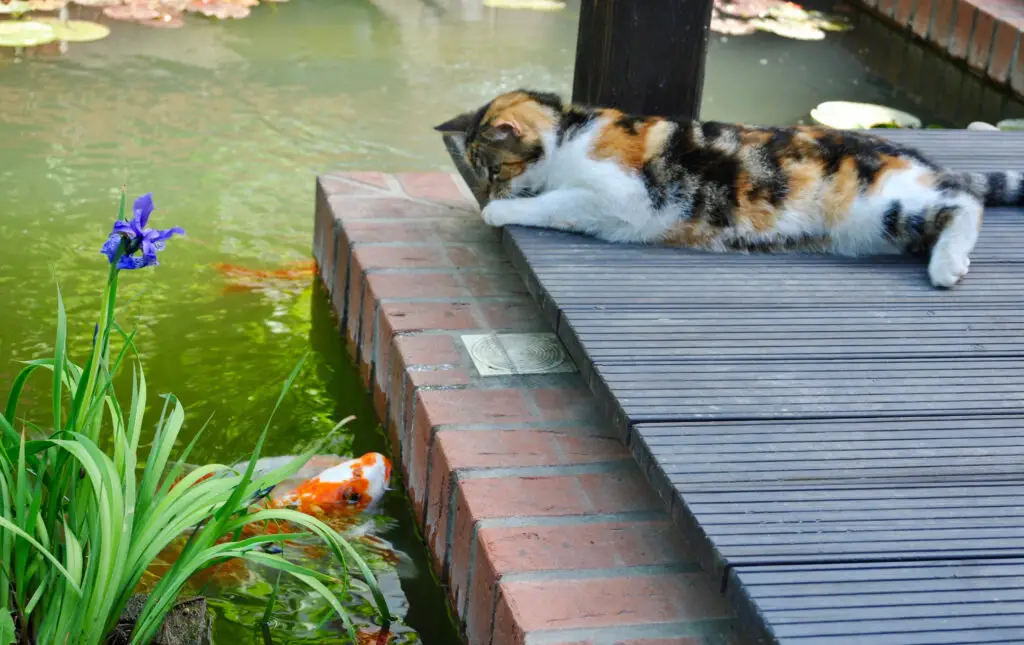
Keeping your koi fish healthy should be a fairly straightforward practice. It may be a significant initial investment, but in the long run, having happy, healthy fish will bring you and your koi joy for many years.
Conclusion
Keeping any animal in captivity can lead to cruelty. When we keep animals, it becomes our responsibility to care for them and also to provide them with everything they need. To give your koi fish a happy life, ensure that they are fed well and have a safe, clean pond in which to live. Koi fish enjoy socializing. Invest in two or more koi fish to keep them happy, and interact with your koi fish at feeding time to develop a loving, loyal relationship with them.
If you notice that your koi fish are feeling down, inspect your koi pond for any hazards. Keep your pond clean and watch for predators that could be making your koi feel anxious.
Resources
https://en.wikipedia.org/wiki/Koi
https://nualgiponds.com/koi-fish-happiness-hand-feeding/


